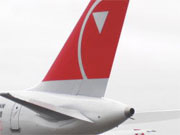Audio
Photos
More from MPR
Resources
| ||||||||||||||||||||||||
Minneapolis, Minn. — Shortly after the voting deadline, Twin Cities local union president Ted Ludwig entered the conference room labeled "Strike Headquarters" to announce the result to a handful of people.
"It's been rejected," Ludwig said. "The members want to continue to strike, so we will continue to strike."
Ludwig sounded weary -- not surprising after 133 days without a paycheck from Northwest. But he says a 57- percent majority rejected the settlement, sending a clear signal union members are not out of patience or energy. About three-fourths of eligible mechanics cast a vote.
"We didn't know their resolve after four months into the strike, so it's really good that we got a message from them now that they want to continue to strike, and that's what we'll do," said Ludwig.
The union's national leader, O.V. Delle Femine, said he is proud of union members for refusing to bow down to Northwest. He had called the offer "the worst contract in the history of airline labor." Northwest said in a short statement it was disappointed mechanics passed up a deal that would have allowed both parties to move forward.
In rejecting Northwest's proposal, union members are passing up four weeks of severance pay, and pay for accrued vacation time. Though union members were also voting on a new contract, it is not a contract that would apply to them.
|
I believe that what Northwest offered us was a slap in the face. I'm a man of principles, and I don't feel it's right what they offered us.
- Striking mechanic Jim Inman
|
Northwest's 880 replacement mechanics would keep their jobs and current wages regardless, though the laid off union mechanics would receive preference for any new jobs that opened up. A settlement would also have allowed striking mechanics to receive unemployment benefits if they haven't found other work.
Strikers like Jim Inman have no need for that. The Northwest mechanic of 16 years has a new job at a steel company. But he said he looks forward to continued picket duty at the airport.
"I believe that what Northwest offered us was a slap in the face," said Inman. "I'm a man of principles, and I don't feel it's right what they offered us. So that's why I voted no."
The mechanics on picket duty at that moment, including Bert Atienza, were similarly pleased to hear of the result.
"That's good then. I was ready for whatever was going to be the result, but I voted no for it," said Atienza. "We're not going to sell out just for the small amount of money they were offering us."
The continued strike could be an ongoing irritant for Northwest. At the Minneapolis-St. Paul airport, some travelers like Matthew Packwood, who was heading home to Boston, are still honoring the mechanics' picket line.
"I think it's a shame they haven't been able to work out some agreement. Part of the reason I have chosen not to fly Northwest this season is because of that. I'm flying American," said Packwood.
But in the month following the strike, Northwest's planes were more full than they were the year before, suggesting most passengers feel like Holly Matson. She says the mechanics' vote, like the strike, didn't mean much to her.
"Not at all. Really didn't matter, which is unfortunate for them, but really didn't affect my travel," said Matson.
"It's a union that's been defeated, and they're trying to decide how they're going to be defeated," said Gary Chaison, a labor relations professor at Clark University.
Chaison says the vote is not the victory union leaders are proclaiming. In Chaison's view, the mechanics' bargaining position will only sink further without one thing they have lacked from the start -- the support of other unions inside or outside Northwest. Chaison says that's not coming, and neither is a better deal from the airline.
"I think the dispute is down to principle. It's a union that has been asking for respect, to be treated as an equal at the bargaining table," said Chaison. "And now even though it has been terribly defeated -- I can't think of an instance where a union has been so terribly defeated in a strike -- it is essentially just saying, 'We are going to just say 'no' to your last offer, go on our way, and that's all there is to it.'"
Union members don't sound like they're going on their way. They're hoping creditors in the Northwest bankruptcy process will pressure the airline to resolve the strike with a better offer. And leaders like local president Ted Ludwig are clinging to the protection afforded by U.S. labor law.
"Northwest is still obligated to negotiate with us. We can file motions at bankruptcy hearings. We're still in the mix; that's what this says," said Ludwig.
The union technically remains the representative of the mechanics at Northwest who replaced its members. It's an awkward situation that could persist as long as the strike does. And while U.S. law says a great deal about labor negotiations, it says very little on how long a strike can last.







